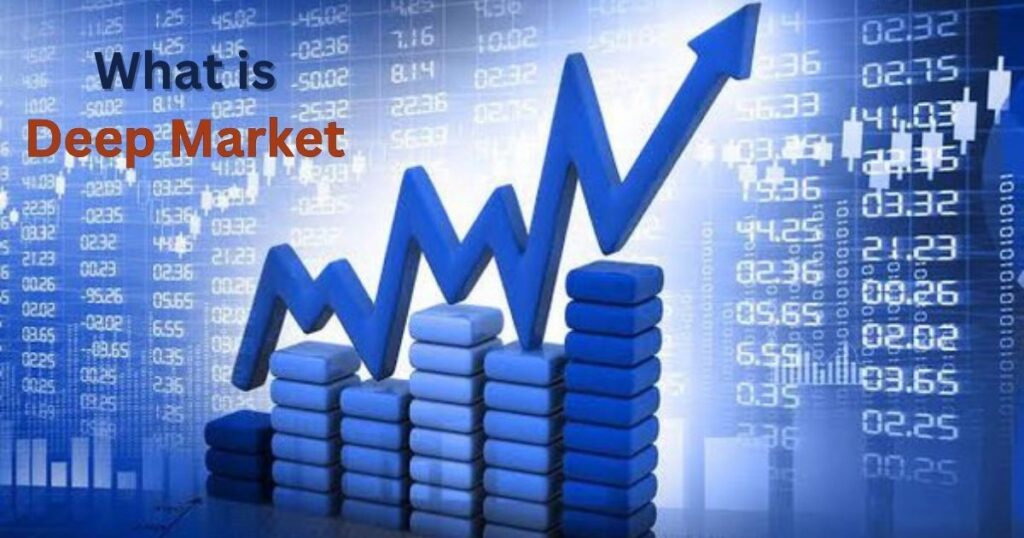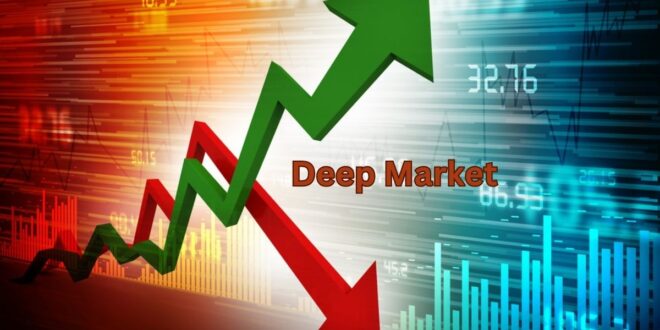Exploring the “Deep Market” can be a strategic method to enhance and diversify your investment portfolio. Yet, comprehending the potential risks is essential before taking the plunge.
For entrepreneurs aiming to branch out into international territories, a deep understanding of the deep market is invaluable. Such insights not only shed light on the broader economic landscape but also illuminate prime investment avenues that might otherwise go unnoticed.
What is Deep Market?
The “Deep Market” refers to a trading environment characterized by an abundance of both buyers and sellers. Within this market, assets can be easily traded with minimal price swings. To break it down, the price a buyer is ready to pay is often closely aligned with what sellers are prepared to accept.

In the realm of financial dealings, a hallmark of the deep market is its exceptional liquidity. Consequently, the peril linked to investments in the deep market tends to be on the lower side. Furthermore, this market often upholds transparency, consistently revealing data on pricing, demand, and supply.
Major Examples of Deep Market
Diving into the heart of the deep market, we find exemplary entities like stock exchanges, specific stocks, and specialized markets among others.
The New York Stock Exchange (NYSE):
Standing as one of the globe’s most ancient and voluminous stock exchanges, NYSE boasts a rich tapestry of companies spanning numerous sectors. The “Deep Market” nature of NYSE is accentuated by the diverse array of institutional investors and its storied role in the annals of global finance.
The National Stock Exchange of India (NSE):
This is not just a stock exchange, but a beacon of technological advancement in trading. Commanding a pivotal role in India’s financial ecosystem, NSE is known for its cutting-edge trade methodologies and expansive investor community.
Gold Market:
While gold’s availability is finite, bringing new mining ventures to the fore is a time-intensive process. Such rarity amplifies its worth and underscores the deep market characteristics of gold. The facets of gold exploration, mining, and the production process bestow the market with enduring stability.
National Association of Securities Dealers Automated Quotations (NASDAQ):
Pioneering the revolution of electronic trading, NASDAQ is globally recognized for its state-of-the-art electronic communication network (ECN) and automated trading infrastructures.
Difference Between Deep Market and Thin Market
Contrasting the thin market, we have the deep market. Let’s explore the primary differences that set them apart.
| Feature | Deep Market | Thin Market |
| Number of buyers and sellers | Many | Few |
| Spread between bid and ask prices | Narrow | Wide |
| Ease of buying or selling an asset | Easy | Difficult |
| Volatility | Low | High |
| Risk | Low | High |
Advantages of Deep Market

Transparency
Information regarding the deep market is readily accessible to investors. They can find out volume of trading, and the financial health of the companies that issue the assets.
As an illustration, stock prices can be viewed openly on platforms such as Google Finance and Yahoo Finance. The volume of trading in stocks and the financial health of companies are also publicly available.
Lower Volatility
Deep markets typically exhibit fewer fluctuations compared to their shallower counterparts. This stability arises from the abundant presence of both buyers and sellers, cushioning any market jolts. Consequently, the risk of investors facing losses during abrupt market dips is reduced.
The foreign exchange arena serves as a prime representation of a deep market. Given the vastness of its trading activities, currency valuations often maintain a semblance of stability, even amidst market turbulence.
Risks of Investing in Deep Market
It’s crucial for investors to carefully assess their risk tolerance, conduct thorough research, and potentially seek professional advice when investing in any market. Spreading investments, managing potential pitfalls, and adopting a forward-looking stance are essential tenets to counter these uncertainties.
Illiquidity
Deep markets generally have higher liquidity. But there can still be instances where certain assets or securities within the market become illiquid. This implies a potential scarcity of buyers or sellers during specific moments. Such scenarios can cause hitches in asset transactions and could culminate in less-than-ideal price points.
Unpredictable Risks
Market prices can experience rapid and unpredictable fluctuations. Market fluctuations can be triggered by outside influences, including economic occurrences, geopolitical shifts, or abrupt alterations in market mood.
Deep markets can also sometimes lead investors to over-concentrate their portfolios in a specific asset class, sector, or region. The absence of varied investments can magnify vulnerabilities, especially if a specific market faces declines or unfavorable occurrences.



